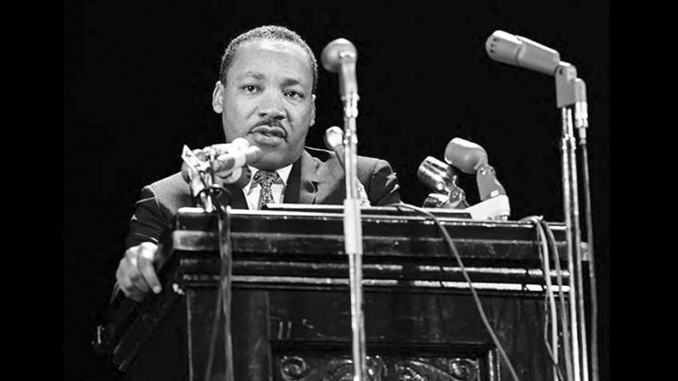
When Greg Clark’s parents came to visit him at Stanford’s Martin Luther King Jr. Research and Education Institute, they had mixed emotions.
Clark, a sophomore research intern at the time, said that on the one hand they loved the photos and documents on display.
On the other hand, the building itself felt like an afterthought.
“They definitely felt like it was very, very small and narrow and tiny and not something worth the caliber of the work,” said Clark, now a 22-year-old political science graduate.
Since its founding in 2005, the institute’s work has mainly been to edit and publish a multi-volume edition of King’s papers, including correspondence, sermons, speeches, and published and unpublished writings under the auspices of the Martin Luther King Jr. Papers Project.
Selected by Coretta Scott King to lead the project, Stanford historian Clayborne Carson also guides the institute’s efforts to develop and disseminate its “Liberation Curriculum,” its scholar- and writer-in-residence programs, its research fellowships, its book publishing program and its sponsorship of conferences and symposia focused on the legacy of the civil rights leader.
Administration blamed for lack of funds
Despite its lofty goals and scholarly achievements, however, the institute lags behind many campus organizations when it comes to fundraising and a coalition of former Stanford student leaders puts the blame squarely on the shoulders of the university’s top administrators.
“We find it incredibly ironic that the university uses Dr. King’s work and his legacy when it’s convenient to them to make a political statement but they don’t actually do the work to sustain the institute at all,” said Shanta Katipamula, 23, the student government president during the 2018-19 school year.
Katipamula and her peers earlier this week sent a letter to the Stanford board of trustees urging the university to make the institute one of its top fundraising priorities.
“This history of sustained institutional neglect is more than just unfortunate. It fails to honor Dr. King’s legacy and suggests that Stanford’s commitment to racial justice rings hollow,” the letter reads. “Investing in the King Institute is a concrete, obvious, and long-overdue way for Stanford to make a commitment to eradicating systemic racism and advancing social justice.”
Stanford officials didn’t immediately respond to a request for comment.
Ronnie Lott helps out
The institute survives primarily due to an original $1 million pledge from former National Football League great Ronnie Lott’s All Stars Helping Kids foundation and a sustained trickle of grant money and donations that together have resulted in a $2 million endowment, Carson said.
And while the institute is by no means in financial jeopardy, it’s clear that the university hasn’t organized a robust fundraising effort to the extent that other campus organizations — like the famed Hoover Institution — enjoy.
“If the donor never knows there’s a King Institute at Stanford, then it’s not really a choice, it’s really a guided choice,” Carson said. “That’s really what’s at work here.”
Carson said he and Dr. King’s widow, Coretta King, met with the university president and provost when he agreed to take on the King Papers Project.
“I accepted a responsibility, but I also think the university accepted a responsibility,” Carson said. “Is the university fulfilling its responsibility?
“We’re not poor and we’re not worried that I’ll come back in 10 years and there won’t be a King Institute,” he said. “It’s really the fact that I have encountered Stanford seniors graduating and I tell them I run this King Institute, and in their four years of Stanford, this is the first they’ve heard of it.”
Katipamula said Friday they are still waiting to hear back from administrators, many of whom are attending the trustees’ quarterly meeting this week.
Institute’s relevance to today’s times
“To me it’s such a win-win. How do you not fundraise for something that is associated with Dr. King, especially in this time when people are looking to Dr. King’s work and his legacy to try to see what they can apply to the current moment that we’re in,” she said.
In addition to pressuring the university to engage in a more robust fundraising effort, the students have organized a campaign to encourage direct donations to the institute.
They are asking graduating seniors and others to contribute $20.20 by visiting their website at https://tinyurl.com/y9zyy9j7
— Bay City News

